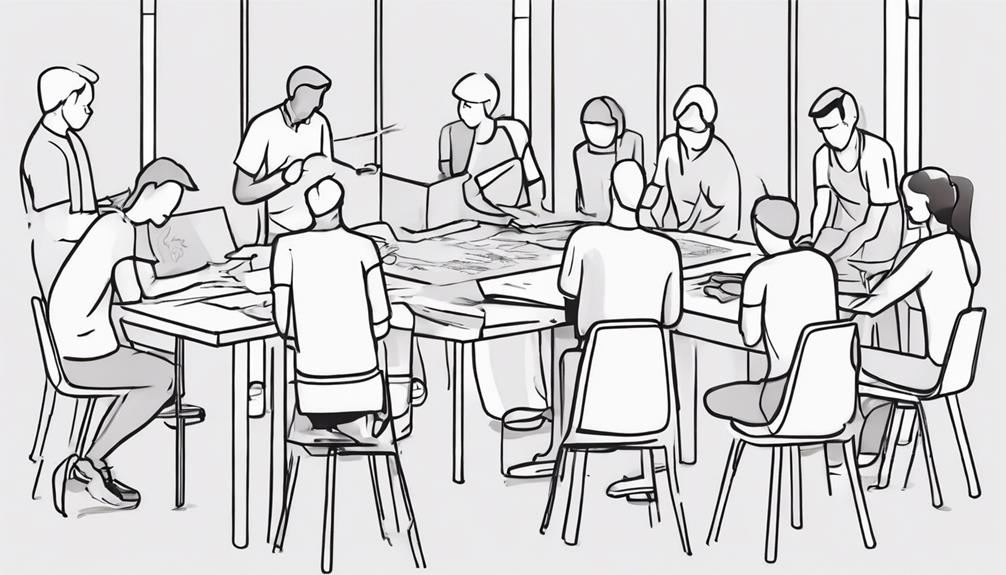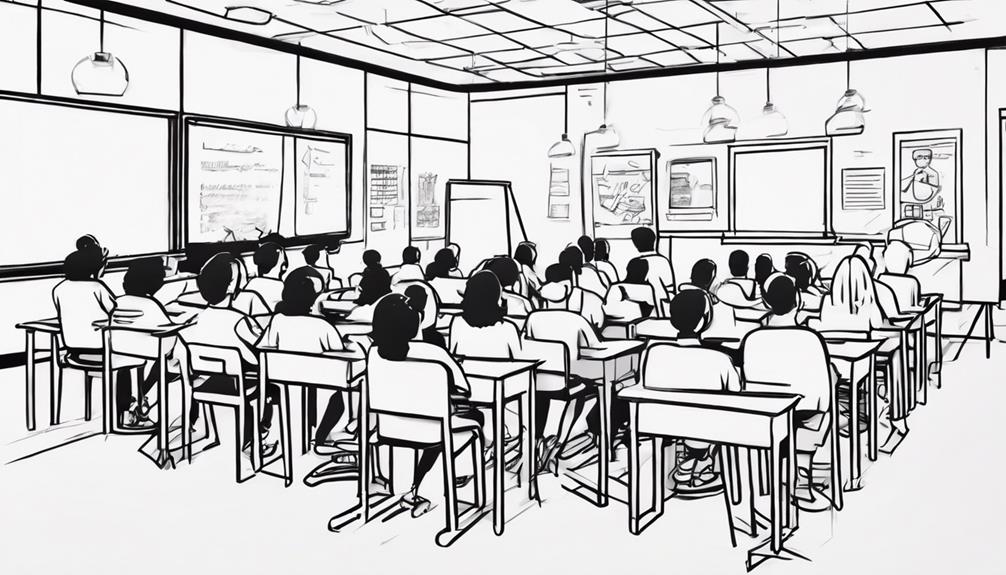In exploring the realm of knowledge dissemination, the distinction between a workshop and a class is a matter of structure, purpose, and engagement. While both serve as educational platforms, workshops offer a hands-on, interactive approach geared towards practical skill enhancement within a condensed timeframe. Conversely, classes lean towards theoretical foundations, catering to a broader spectrum of subjects with a structured curriculum. The varying dynamics of workshops and classes raise intriguing questions about the effectiveness of each method in fostering learning outcomes.
Key Takeaways
- Workshops prioritize hands-on, practical skill development through interactive activities.
- Classes focus on theoretical knowledge delivery through lectures and structured curriculum.
- Workshops offer immediate feedback, collaboration, and real-world skill application.
- Classes involve assessments, exams, and projects to measure comprehension and learning outcomes.
Definition of Workshop

A workshop is an interactive educational session designed to provide practical skills and hands-on learning experiences within a condensed timeframe. Unlike traditional classes, workshops prioritize the application of knowledge through active participation and real-world scenarios. Participants engage in activities that simulate practical challenges they may encounter in their respective fields. This hands-on approach allows individuals to develop and refine their skills in a more dynamic environment.
The interactive nature of workshops fosters immediate feedback and collaboration among participants. Through group discussions, problem-solving tasks, and interactive exercises, individuals not only learn from the workshop leader but also from their peers. This exchange of ideas and experiences enhances the overall learning process and encourages critical thinking.
Moreover, workshops are structured to be intensive and focused, typically lasting up to 8 hours. This condensed timeframe ensures that participants receive concentrated learning experiences without the extended commitment required by traditional classes. Overall, workshops serve as valuable opportunities for individuals to acquire practical skills efficiently and effectively.
Definition of Class
Exploring the concept of a class reveals its fundamental role in providing structured theoretical instruction and academic content delivery. A class is a scheduled session or course that typically focuses on theoretical learning and academic content. Instructors or teachers lead classes, delivering information through lectures, presentations, and assignments. Students in a class follow a structured curriculum and participate in activities to enhance their understanding of the subject matter. Class sessions can vary in length, from a single session to multiple sessions spread out over a period of time. The primary goal of a class is to impart knowledge, develop skills, and provide a learning environment for students to engage with the material. In contrast to a workshop, a class is more traditional in its approach to education, offering a systematic way of learning. With the rise of online education, classes can now also refer to an online course where educational content is created and delivered over the internet, providing flexibility and accessibility to a broader audience.
Interactive Learning in Workshops

Interactive learning in workshops is a dynamic and hands-on approach that fosters real-time problem-solving and practical skill development through engaging activities and group discussions. Workshops provide a platform where participants actively engage in exercises that require applying knowledge in real-world scenarios. By incorporating hands-on activities, workshops enable individuals to experience firsthand the practical applications of the concepts being taught. This interactive setting encourages peer-to-peer interaction, networking opportunities, and collaborative learning experiences. Unlike traditional classes that may focus more on theoretical knowledge, interactive workshops prioritize immediate skill enhancement and practical proficiency. The dynamic and engaging environment of workshops not only enhances specific skills but also allows participants to learn from each other's experiences, ultimately leading to a more comprehensive understanding of the subject matter. Through interactive learning, workshops promote active participation, critical thinking, and the development of transferable skills that can be directly applied in various professional settings.
Passive Learning in Classes
Passive learning in classes is characterized by a predominantly one-sided dissemination of information, where students typically act as passive recipients rather than active participants in the educational process. When considering the dynamics of passive learning in traditional classroom settings, several key points emerge:
- One-Way Flow of Information: In passive learning environments, such as online education or lecture-based classes, the transfer of theoretical knowledge primarily occurs from the instructor to the students.
- Recipient Role of Students: Students often find themselves in a position where they receive information without actively engaging in the material or contributing to the learning process.
- Limited Interactive Engagement: Class settings may lack opportunities for interactive engagement, hindering the development of critical thinking skills and practical application of knowledge.
- Emphasis on Theoretical Knowledge: Traditional classes tend to focus on delivering theoretical knowledge through lectures rather than exploring concepts in a practical manner, potentially limiting the depth of understanding and real-world application for students.
Practical Application in Workshops

In contrast to passive learning in traditional classroom settings, workshops prioritize hands-on practical application of skills, fostering active participation and immediate engagement with the material. Participants in workshops engage in interactive sessions that promote practical training and immediate application of newly acquired skills. Expert facilitators play a crucial role in guiding participants through activities designed to enhance their understanding and proficiency in specific areas. The emphasis in workshops is on experiential learning, where individuals learn by doing rather than just listening.
| Key Aspects | Description |
|---|---|
| Practical Training | Workshops focus on providing hands-on experience to enhance skill development. |
| Hands-on Learning | Participants actively engage in activities to apply theoretical knowledge practically. |
| Interactive Sessions | Sessions are designed to encourage participation, discussion, and collaboration. |
| Defined Objectives | Workshops have clear goals and agendas to ensure focused learning outcomes. |
| Immediate Application | Skills learned in workshops can be immediately applied in real-world scenarios. |
Theoretical Approach in Classes
Emphasizing the acquisition of foundational theoretical knowledge, classes in educational settings serve as platforms for students to engage with academic concepts through lectures, readings, and discussions. When it comes to the theoretical approach in classes, there are several key aspects to consider:
- Focus on Theoretical Knowledge: Classes primarily concentrate on delivering theoretical concepts to students, aiming to provide them with a strong foundation in a specific field of study.
- Engagement with Academic Material: Students in classes interact with theoretical content through various means such as lectures, readings, and discussions to deepen their understanding of complex topics.
- Comprehensive Understanding: The goal of theoretical classes is to offer students a comprehensive understanding of academic subjects through theoretical material and teaching materials.
- Assessment of Knowledge: Assessments, exams, and assignments are commonly used in theoretical classes to evaluate students' grasp of theoretical concepts and their ability to apply them in different contexts.
In online courses and traditional classroom settings, the theoretical component plays a significant role in shaping students' knowledge and understanding of various subjects.
Collaborative Environment in Workshops

Workshops facilitate a collaborative environment that promotes active engagement and interactive learning among participants. In workshops, individuals come together to share their knowledge, experiences, and insights, fostering a sense of community and teamwork. The group interactions in workshops create a dynamic learning environment where immediate feedback and real-time problem-solving can occur. Here is a table illustrating the key aspects of collaborative environments in workshops:
| Aspects of Collaborative Environments in Workshops | |
|---|---|
| Active Engagement in Discussions | Participants engage in dialogue and exchange ideas. |
| Hands-On Activities | Workshops often involve practical tasks for active learning. |
| Knowledge Sharing | Individuals share their expertise to enhance overall learning. |
| Networking Opportunities | Participants connect with each other for potential collaborations. |
| Community and Teamwork | Workshops foster a sense of belonging and cooperation among attendees. |
Individual Learning in Classes
In classes, individual learning is shaped by class size impact and student-teacher interaction dynamics. The number of students in a class can influence the level of personalized attention each individual receives from the teacher. Furthermore, the quality of student-teacher interaction plays a critical role in facilitating effective learning experiences for each student.
Class Size Impact
The impact of class size on individual learning within academic settings is a crucial factor that significantly influences student engagement and academic outcomes.
- Smaller class sizes foster better student-teacher interaction, allowing for more personalized attention and tailored instruction.
- Students in smaller classes tend to be more actively engaged, participating in discussions and receiving immediate feedback.
- Reduced class size promotes collaboration among peers, enhancing overall student engagement and creating a supportive learning environment.
- Research consistently demonstrates that smaller class sizes positively correlate with improved student achievement, motivation, and academic performance.
Understanding the influence of class size on student learning is essential for optimizing educational experiences and maximizing outcomes in academic settings.
Student-Teacher Interaction
Enhancing individual learning outcomes in academic settings, student-teacher interaction in classes is characterized by personalized guidance and direct feedback tailored to meet the specific needs of each student. In a class setting, teachers can closely monitor and address the individual learning needs and progress of students, offering focused attention to enhance understanding and development. This personalized approach allows for the adaptation of instruction to match the unique learning requirements of each student, fostering a more effective educational experience. The direct interaction between students and teachers in classes facilitates a supportive environment where students can actively engage with the material and receive immediate feedback, ultimately contributing to improved learning outcomes.
| Workshop | Class | Student-Teacher Interaction |
|---|---|---|
| Group-oriented | Individual-focused | Personalized guidance |
| Short-term | Long-term | Direct feedback |
| Broad coverage | Specific content | Tailored to student needs |
Skill Development in Workshops

Workshops provide a hands-on learning approach, emphasizing practical application exercises to enhance skill development. Through interactive activities and discussions, participants engage actively in the learning process, fostering immediate application of newly acquired skills. Led by experts, workshops offer intensive opportunities for individuals to acquire and refine their skillsets in a focused and collaborative environment.
Hands-On Learning Approach
In the realm of hands-on learning approaches for skill development, workshops offer a dynamic platform for participants to actively engage in practical exercises and interactive activities.
Key Points:
- Workshops provide a hands-on learning experience, allowing participants to apply knowledge in real-time.
- Interactive activities in workshops promote immediate skill enhancement and active engagement.
- Practical exercises enable participants to acquire skills that are directly transferable to real-world scenarios.
- The hands-on approach in workshops facilitates direct feedback and guidance from experts, leading to rapid skill improvement.
Practical Application Exercises
Practical application exercises in workshops are designed to facilitate the development and refinement of specific skills through hands-on engagement and real-time practice. These interactive activities allow participants to apply their knowledge in a practical setting, promoting a deeper understanding of the subject matter. By engaging in hands-on practical tasks, individuals can actively learn and receive immediate feedback, enhancing their competency and proficiency in targeted areas. Workshops offer a dynamic environment that encourages active participation and skill development, setting them apart from traditional classroom-based learning. The table below illustrates the key differences between practical application exercises in workshops and theoretical classes.
| Practical Application Exercises | Theoretical Classes |
|---|---|
| Hands-on practical engagement | Passive learning |
| Real-time practice and feedback | Theoretical knowledge |
| Interactive activities | Lectures and readings |
Knowledge Acquisition in Classes
Knowledge acquisition in classes is primarily focused on theoretical understanding through structured lectures, readings, and assignments.
- In-depth Study: Students in classes immerse themselves in the theoretical part of the subject matter, delving into complex concepts to build a strong foundational understanding.
- Engagement in Learning: Class activities such as discussions, research projects, and assessments are designed to reinforce the learning objectives and deepen comprehension.
- Critical Thinking Development: The main goal of classes is to impart knowledge and cultivate critical thinking skills essential for professional training.
- Structured Curriculum: Classes typically follow a well-defined course structure, guiding students through a specific topic or subject area in a systematic manner.
In classes, the emphasis is on the acquisition of knowledge through a structured approach, enabling students to grasp the theoretical foundations of a subject while honing their analytical and critical thinking skills. This methodical process forms the basis for a comprehensive understanding of the subject matter and lays the groundwork for advanced learning and practical application in the future.
Immediate Feedback in Workshops

Immediate feedback in workshops plays a pivotal role in facilitating real-time responses and improvements for participants. In workshops, immediate feedback is provided to participants promptly after they engage in interactive activities. This instant feedback mechanism allows individuals to grasp the effectiveness of their actions immediately and make necessary adjustments on the spot. By incorporating interactive activities into workshops, participants can apply the feedback received right away, reinforcing the learning process. The quick turnaround in feedback not only aids in understanding one's progress but also enhances overall engagement and participation. Furthermore, the dynamic nature of immediate feedback in workshops fosters a responsive learning environment, where individuals can actively participate, receive feedback, and refine their skills in real-time. This real-time feedback loop is a distinguishing feature of workshops, offering a more interactive and engaging learning experience compared to traditional classroom settings.
Traditional Assessment in Classes
In contrast to the dynamic and interactive nature of immediate feedback in workshops, traditional assessments in classes rely on structured evaluations such as exams, quizzes, essays, and projects to gauge student comprehension and application of course material. These class assessments are typically conducted in a controlled environment to ensure fairness and accuracy in evaluating student performance.
Key Points:
- Structured Evaluations: Class assessments encompass a variety of evaluation methods like exams, quizzes, essays, and projects.
- Controlled Environment: These assessments are carried out in a controlled setting to accurately measure individual understanding and knowledge application.
- Assessing Comprehension: Class assessments are designed to test students' retention of knowledge, critical thinking abilities, and practical application of learned concepts.
- Predefined Grading Criteria: Grading in traditional assessments follows predetermined criteria focusing on specific learning objectives and outcomes.
Traditional assessments in classes play a crucial role in measuring students' academic progress and mastery of course material, providing a comprehensive evaluation of their learning outcomes within a structured academic framework.
Learning Outcomes Comparison

Comparing the learning outcomes between workshops and classes reveals distinct differences in the acquisition and application of skills and knowledge. Workshops, with their focus on practical skills and hands-on experiences, offer immediate application opportunities within a short time frame, typically lasting a few hours to a couple of days. In contrast, classes emphasize theoretical knowledge and academic training, often spanning weeks or months for comprehensive learning. Workshops promote interactive discussions and networking, fostering a sense of community among participants, while classes provide structured progression and self-paced learning environments.
The hands-on nature of workshops enables quick engagement and real-time interaction through activities and exercises, enhancing practical skill development. On the other hand, classes facilitate in-depth theoretical content absorption and exploration, allowing for a deeper understanding of complex concepts. Workshops generate revenue through ticket sales or sponsorships, leveraging limited resources, whereas classes offer income potential through enrollment fees or subscriptions for long-term passive income streams.
Frequently Asked Questions
What Is the Difference Between a Workshop and Class?
When comparing a workshop to a class, the key distinctions lie in the interactive learning approach, hands-on experience, and collaborative environment workshops offer. Workshops prioritize practical skills development through engaging activities and immediate application of knowledge within a peer group setting. In contrast, classes often focus on theoretical content and structured curriculum, utilizing activities to enhance understanding in a specific subject area over an extended period.
What Is the Difference Between a Workshop and a Session?
In delineating between a workshop and a session, the key distinction lies in the depth of interactive engagement and hands-on learning that workshops offer. Sessions, while part of a larger workshop or class, may lack the collaborative environment and practical experience characteristic of workshops. Workshops emphasize skill-building exercises and group participation, fostering a more immersive and experiential learning setting. This distinction underscores the value of workshops in cultivating practical skills through interactive and participatory methods.
What Is Difference Between Workshop and Training?
The key distinction between a workshop and training lies in their focus and methodologies. Workshops prioritize skill development through interactive learning, hands-on experience, and practical application. They foster problem-solving and group collaboration, encouraging participants to actively engage and apply their knowledge. On the other hand, training typically follows a structured curriculum, focusing on imparting specific knowledge or skills. Workshops offer a more dynamic and participatory approach to learning compared to traditional training sessions.
What Is the Purpose of a Workshop?
The purpose of a workshop is multifaceted, aiming to provide participants with hands-on learning experiences that foster skill development and collaboration. Workshops encourage creativity through interactive activities and problem-solving exercises, allowing for immediate application of learned skills. Additionally, workshops facilitate peer interaction, feedback sharing, and networking opportunities, creating a conducive environment for knowledge exchange and community building. Ultimately, the primary goal of a workshop is to engage participants in practical skill acquisition through interactive and participatory methods.
Conclusion
In conclusion, workshops and classes serve distinct purposes in the realm of education. Workshops offer interactive, practical learning experiences with immediate feedback, while classes focus on knowledge acquisition through structured, theoretical content and traditional assessment methods. The key difference lies in the emphasis on hands-on application in workshops versus passive learning in classes. Ultimately, the choice between workshops and classes depends on the desired learning outcomes and teaching approaches.
